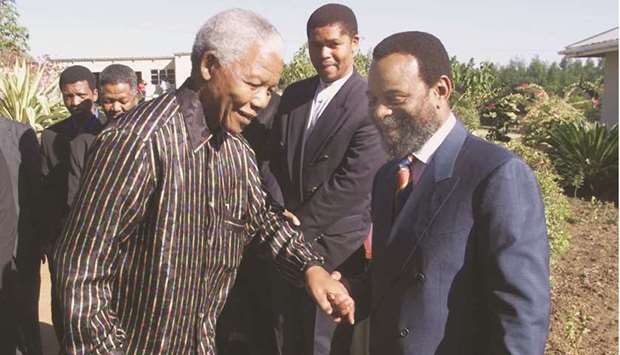Goodwill Zwelithini, the controversial but revered king of the Zulus, South Africa’s largest ethnic group, died yesterday aged 72 after weeks in hospital for a diabetes-related illness, the royal palace announced.
The king wielded great influence among millions of Zulus and beyond through his largely ceremonial and spiritual role, despite having no official power in modern South Africa.
In a short statement, the palace said the king “took a turn for the worse and he subsequently passed away in the early hours of this morning”.
Born in Nongoma, a small town in the south-eastern Kwa-Zulu Natal province, Zwelithini ascended the throne in 1971 during the apartheid era. No succession plans have been divulged yet. His body will be taken from a Durban hospital to the palace in Nongoma, around 300km away, to lie in state for “a couple of days”, said Mangosuthu Buthelezi, a powerful veteran politician who is also a Zulu prince.
President Cyril Ramaphosa has granted the king a special official funeral of the type usually reserved for presidents and ex-presidents. The date is yet to be announced, but in the meantime national flags will fly at half-mast. Ramaphosa said the king “will be remembered as a much-loved, visionary monarch who made an important contribution to cultural identity, national unity and economic development”.
Returning from hiding over assassination fears, Zwelithini was crowned the eighth Zulu monarch at the age of 23. Under the white-minority regime which ended in 1994, kings ruled homelands where most blacks were confined to defuse broader national struggles. He was to become the longest-reigning of all known Zulu kings – dying during his 50th year on the throne.
The Zulus are South Africa’s largest ethnic group with over 11mn people. He was “very popular because he came from a very powerful and defiant line of kings,” one of whom defeated the British during the 1800s Anglo-Zulu war, said historian and cultural analyst Ntuli Pikita. And Zwelithini maintained that culture of defiance.
Traditional rulers play a largely symbolic role in modern South Africa, where they are constitutionally recognised.
“We have lost one of the giants of the institution of traditional leadership on the continent,” Zolani Mkiva, secretary general of a pressure group, the Congress of Traditional Leaders of South Africa, told AFP.
His home province has declared a week of mourning, with its leader Sihle Zikalala describing him as “the father and pillar of our nation... our unique torch-bearer during some of the darkest times that this country has ever seen”.

In this file photo taken on June 12, 1999, outgoing South African president Nelson Mandela is welcomed by Zulu King Goodwill Zwelithini (right) at his Dlamahlahla Palace in Mahhashini in Kwazulu-Natal province.
